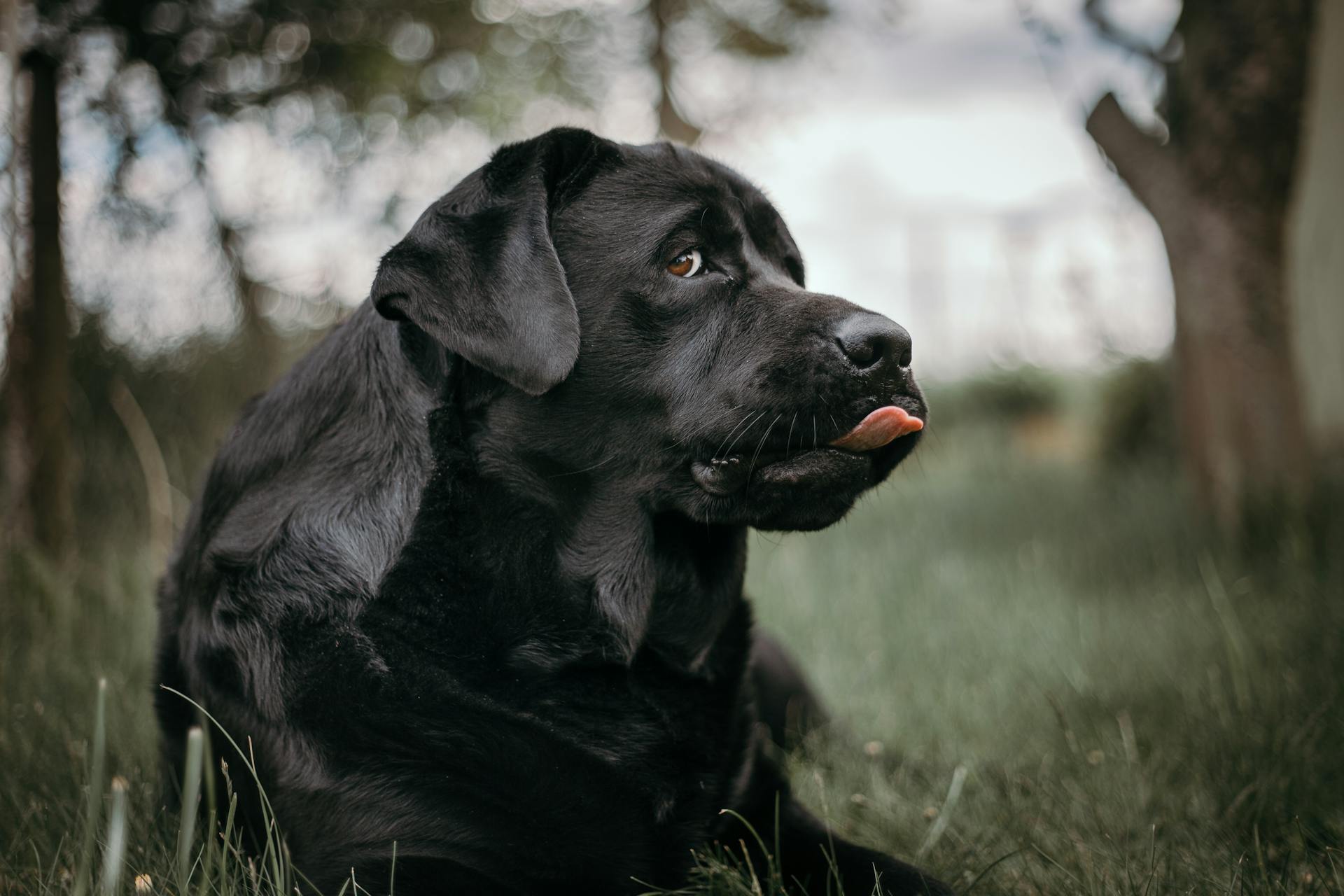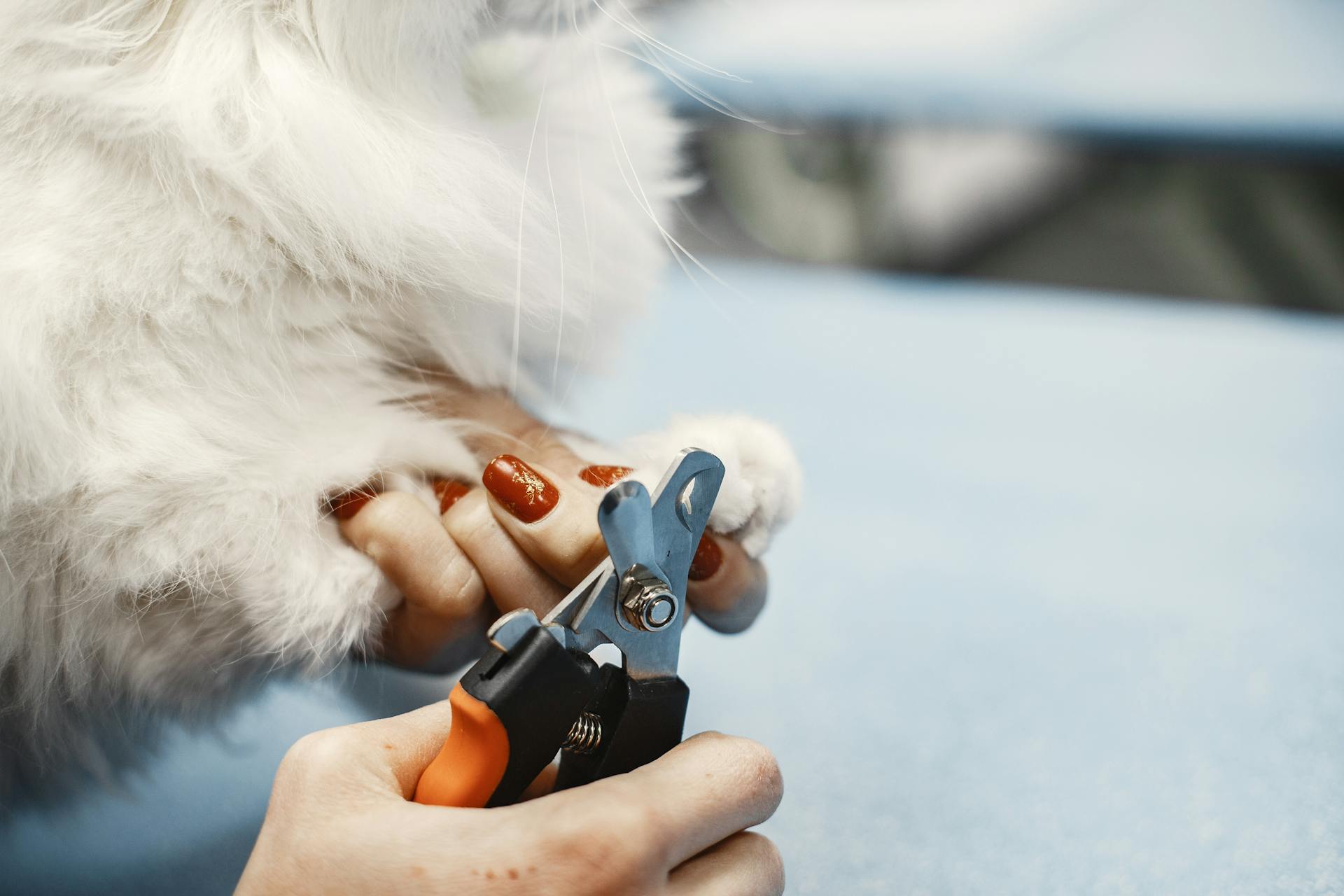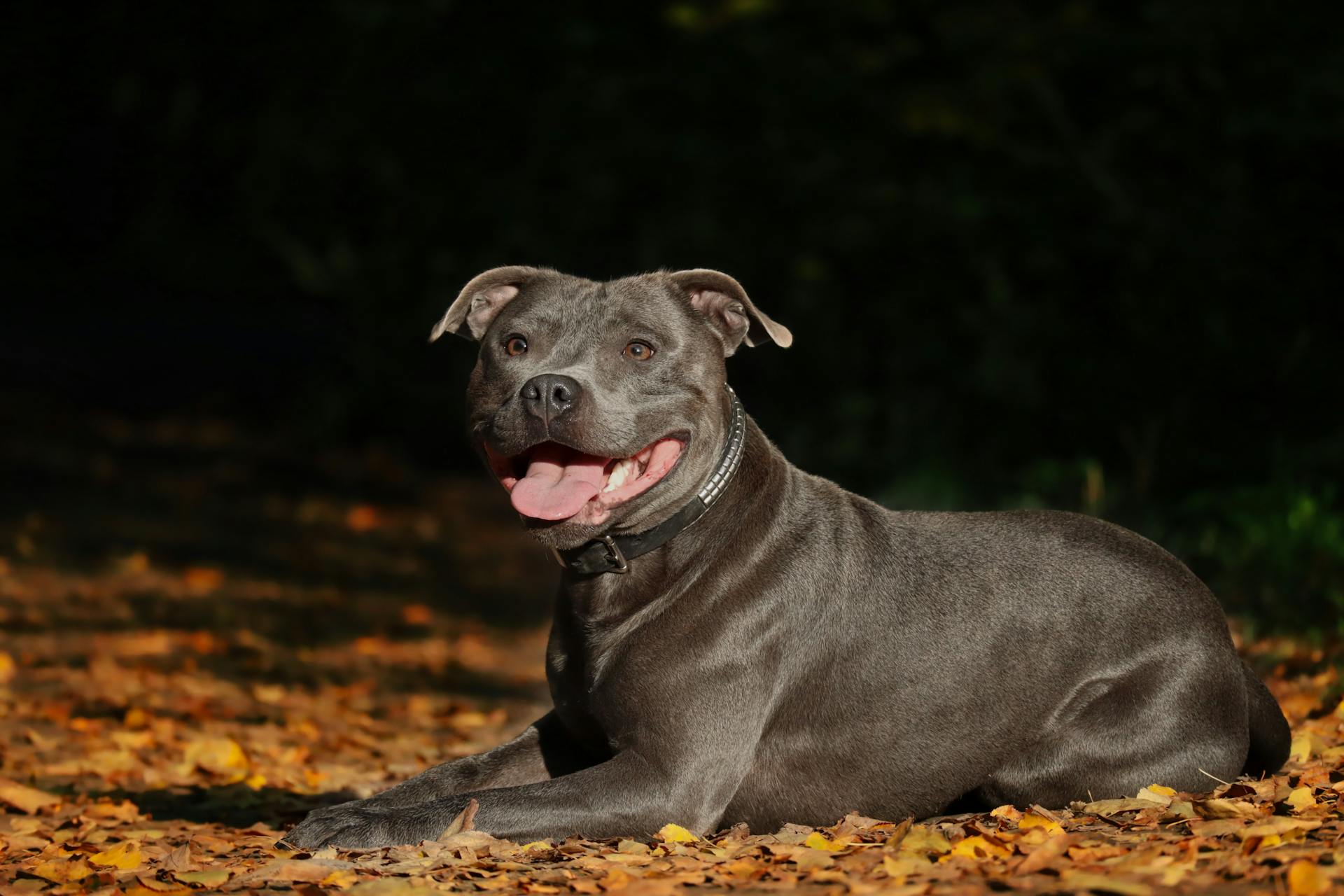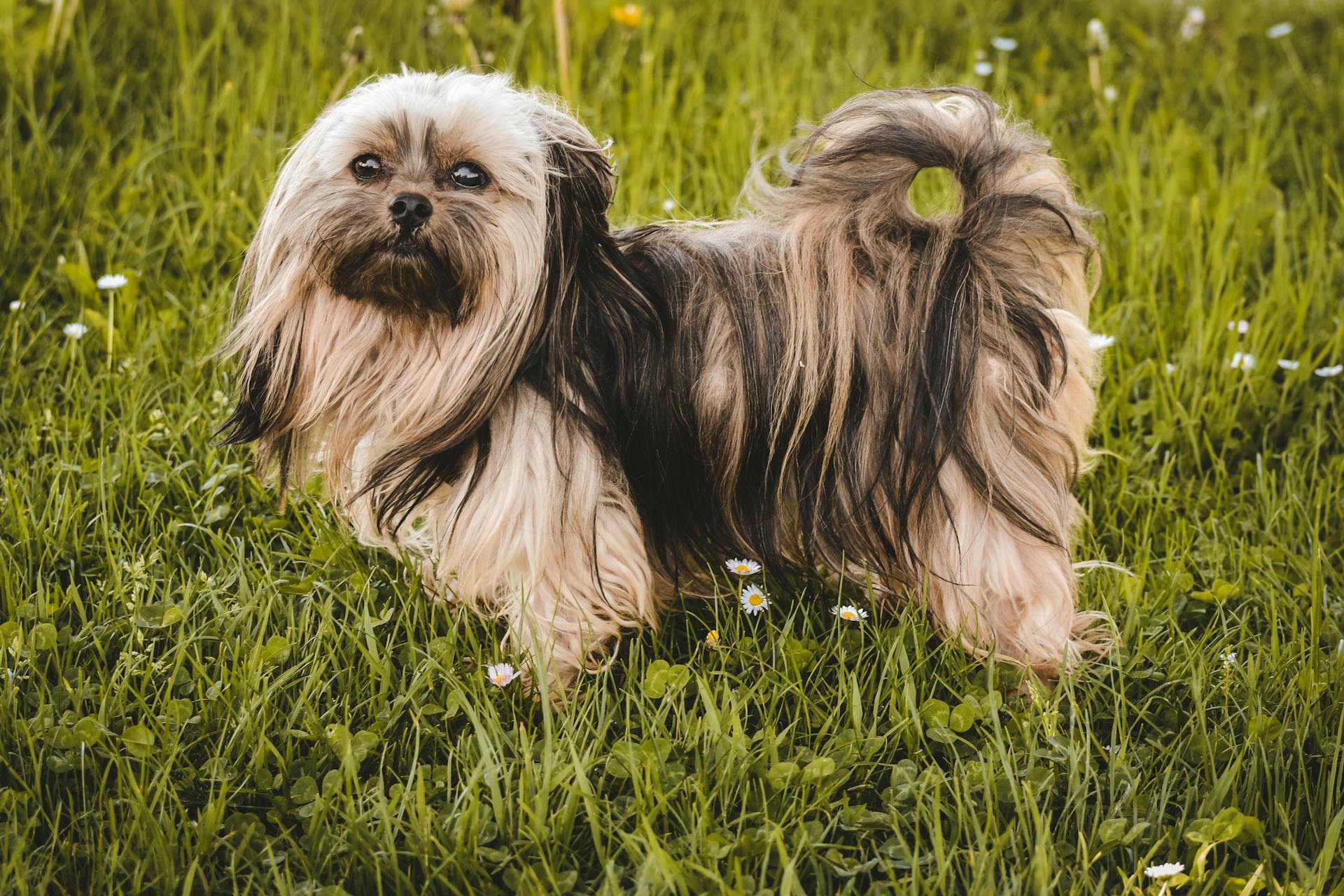
As a new Shih Tzu owner, it's essential to understand the different life stages your furry friend will go through. This will help you provide the best care and attention at each stage.
Shih Tzus are considered puppies from birth to 6 months old. During this stage, they require plenty of socialization and training to become confident and well-behaved adult dogs.
A Shih Tzu's adult stage typically lasts from 1 to 7 years old. At this age, they need regular exercise, a balanced diet, and regular grooming to prevent health issues.
As Shih Tzus enter their senior stage, usually around 8 years old, their energy levels decrease, and they require more frequent veterinary check-ups to monitor their health.
See what others are reading: Life with Shih Tzus
Health Issues
As your Shih Tzu grows and ages, it's essential to be aware of the potential health issues that may arise. Shih Tzus are prone to Brachycephaly-related breathing health problems due to their skull shape.
Regular veterinary check-ups and up-to-date vaccinations can help prevent some of these issues, but some conditions are more common. Intervertebral disc disease (IVDD) is a common condition in Shih Tzus, where the jelly-like cushion between vertebrae slips or ruptures, causing pain and potentially paralysis.
To prevent IVDD, provide ramps or steps for your pet from puppyhood on, and keep your Shih Tzu at a healthy weight. This will reduce the risk of IVDD and other musculoskeletal problems.
Here are some common musculoskeletal problems that may affect your Shih Tzu:
- Intervertebral disc disease (IVDD)
- Patellar luxation (kneecap slipping out of place)
- Hip dysplasia (inherited disease causing improper hip joint formation)
Early detection and treatment of these conditions can prevent undue pain and suffering. Regular veterinary check-ups and a healthy lifestyle can go a long way in preventing heart disease, which can occur both early and later in life in Shih Tzus.
Joint Problems
Joint problems are a common issue in Shih Tzus. Intervertebral disc disease (IVDD) is a condition that can cause severe pain and even paralysis in your dog.
If you notice your Shih Tzu is suddenly unable or unwilling to jump, has a hunched back, cries out, or refuses to eat or go potty, it's likely he's in severe pain due to IVDD. In many cases, surgical removal of the ruptured discs is recommended within 24 hours of symptom onset for the best results.
Providing ramps or steps for your pet from puppyhood on can help prevent back strain and reduce the risk of IVDD. Weight control is also crucial in preventing this condition.
Your Shih Tzu's kneecap may slip out of place, causing patellar luxation. You might notice your pet picking up a back leg or skipping and hopping while running.
If the problem is mild, your friend may not require much treatment beyond arthritis medication. However, when symptoms are severe, surgery may be needed to realign the kneecap.
Hip dysplasia is another common joint problem in Shih Tzus, caused by improperly formed hip joints that lead to arthritis. You may notice your dog has lameness in his hind legs or difficulty getting up from lying down.
X-rays can help identify hip dysplasia early on, and treatment can prevent discomfort and pain. Surgery may be considered in severe cases, and keeping your dog at a healthy weight can also help prevent or delay the onset of arthritis.
If this caught your attention, see: Shih Tzu Weight Full Grown
Allergies
Allergies can be a real challenge for Shih Tzus, causing skin itchy issues that can start as early as one to three years old and worsen every year.
The feet, belly, folds of the skin, and ears are the most commonly affected areas, with symptoms including licking the paws, rubbing the face, and frequent ear infections.
Licking the paws and rubbing the face are common signs of allergies in Shih Tzus.
Frequent ear infections can be painful and annoying, and are often caused by allergies, swimming, overgrowth of hair in the ear canals, and accumulation of earwax.
A foul odor from the ears, or if his ears seem painful to the touch, are signs that your Shih Tzu may have an ear infection.
By monitoring for ear infections and treating them early, you can reduce the likelihood of eardrum damage that can lead to deafness.
Here are some common signs of allergies in Shih Tzus:
- Licking the paws
- Rubbing the face
- Frequent ear infections
- A foul odor from the ears
- Ears that seem painful to the touch
Heart Disease
Shih Tzus are prone to multiple types of heart disease, which can occur both early and later in life.
Regular veterinary check-ups are crucial in detecting heart disease early, allowing for treatment with medication that can prolong your pet's life for many years.
Heart murmurs and abnormal heart rhythms are common signs of heart disease in Shih Tzus, and your veterinarian will listen for these during an examination.
Annual heart health checks may include X-rays, an ECG, or an echocardiogram, depending on your dog's risk factors.
Veterinary dental care and weight control are also essential in preventing heart disease in Shih Tzus, as poor dental health and excess weight can contribute to heart problems.
Expand your knowledge: Shih Tzu Stubborn
Care and Management
Routine care is essential for your Shih Tzu's overall health and happiness. Supervise your pet as you would a toddler, keeping doors closed and picking up after yourself to keep her out of trouble.
To keep her coat beautiful, regular brushing and grooming are necessary. Brush her teeth at least three times a week, as Shih Tzus often have serious problems with their teeth. Clean her ears weekly, even as a puppy.
You might like: Shih Tzu Dog Teeth
A daily walk and regular inside play are essential for her physical and mental well-being. Shih Tzus are highly intelligent and can be taught to perform a variety of tricks to help keep her mentally stimulated.
By following these simple care and management tips, you can help your Shih Tzu live a long, happy, and healthy life.
Training
Training is a great way for you and your Shih Tzu to bond, but it's essential to start early. Shih Tzu puppies can be strong-willed, so it's best to begin training from 8 weeks old.
Keep training sessions short, around five to ten minutes, to prevent boredom. This will help keep your pup engaged and focused.
A combination of short walks and games is perfect for expelling excess energy and avoiding unwanted behaviors. Shih Tzus can be hyper, so it's crucial to provide regular exercise and mental stimulation.
Shih Tzus love treats, but they love their humans more. Proper socialization is vital to avoid possessiveness and ensure a strong bond between you and your dog.
Suggestion: At What Age Do Shih Tzu Puppies Stop Growing
Here are some tips for training your Shih Tzu:
- Be consistent and patient, as Shih Tzus can be stubborn at times.
- Use positive reinforcement, such as treats and praise, to encourage good behavior.
- Keep training sessions fun and engaging, with plenty of rewards and praise.
Remember, every dog is unique, so be sure to tailor your training approach to your Shih Tzu's individual needs and personality.
Health & Care
To keep your Shih Tzu happy and healthy, it's essential to establish a routine care schedule. This should include regular brushing and grooming to keep her coat beautiful.
Supervise your pet as you would a toddler by keeping doors closed, picking up after yourself, and blocking off rooms as necessary. This will keep her out of trouble and away from objects she shouldn't put in her mouth.
Brush your Shih Tzu's teeth at least three times a week to prevent serious problems with her teeth. Clean her ears weekly, even as a puppy, to prevent infections.
A daily walk and regular inside play are necessary for a happy and healthy Shih Tzu, especially since she's well suited for apartment living. Be aware of the signs of heat stress and avoid prolonged exposure to warm temperatures.
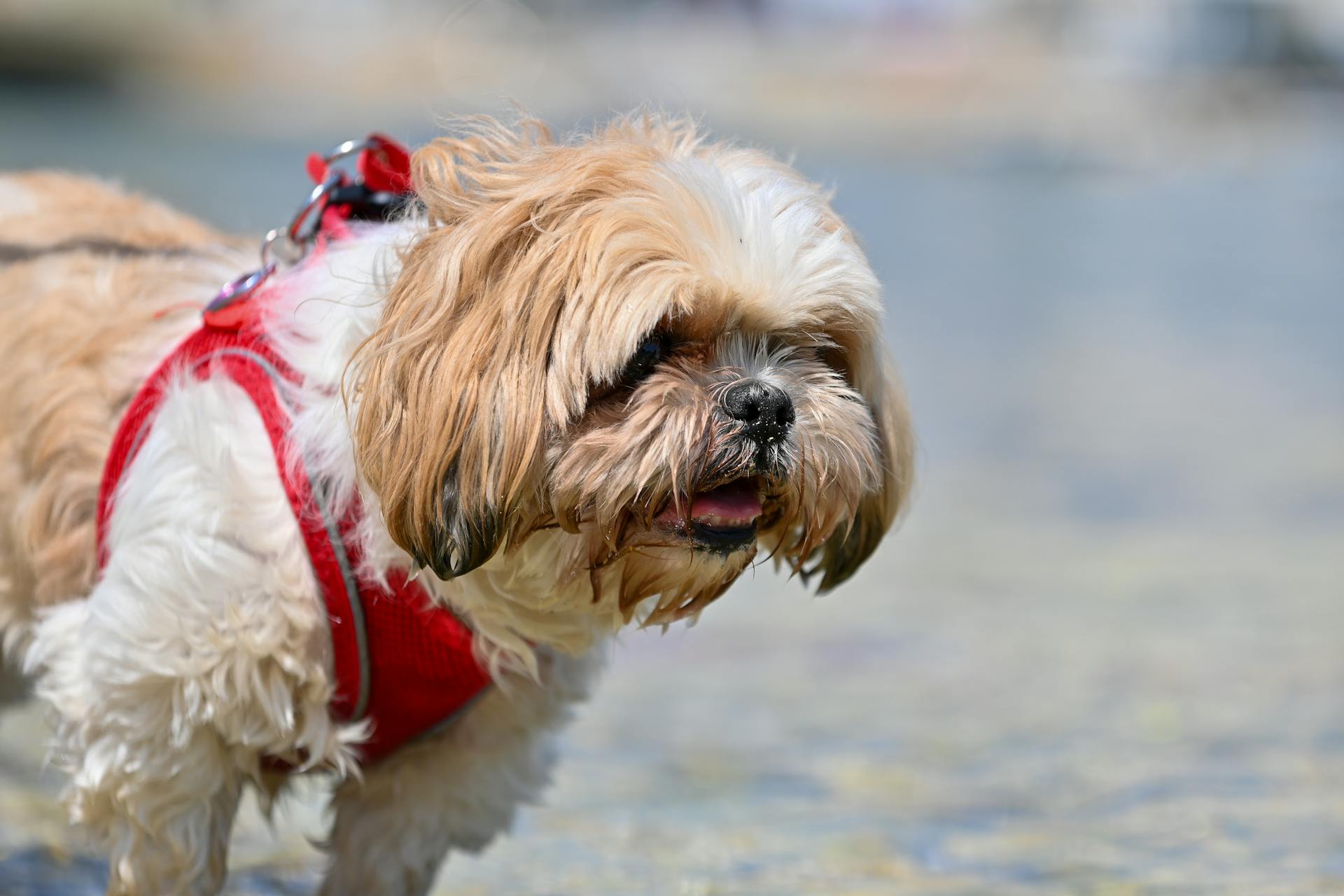
A high-quality diet appropriate for her age is crucial for your Shih Tzu's overall health. Feed her a breed-appropriate food twice a day, sticking to the portion size guidelines, and consider her age, lifestyle, and activity level.
Here's a summary of your Shih Tzu's daily care needs:
- Brush her teeth at least three times a week.
- Clean her ears weekly.
- Provide a daily walk and regular inside play.
- Avoid prolonged exposure to warm temperatures.
- Feed a high-quality diet appropriate for her age.
Regular veterinary check-ups and keeping her up to date with vaccines and parasite prevention medications will help prioritize her health.
Genetic and Size Considerations
As a Shih Tzu owner, understanding the genetic and size considerations of your furry friend is crucial for their overall health and well-being.
Shih Tzus are a toy breed, with adult dogs typically weighing between 9-16 pounds and standing between 8-11 inches tall.
Their small size means they require minimal exercise, but regular walks and playtime are still essential to prevent obesity and other health issues.
Shih Tzus are prone to certain health problems, including eye and respiratory issues, due to their flat face and brachycephalic skull structure.
Their genetic makeup also makes them susceptible to dental problems, so regular dental care is vital to prevent tooth decay and gum disease.
Genetic Predispositions
Genetic predispositions play a significant role in determining a dog's size and growth rate. A study on the genetics of canine growth found that genetics account for 50-60% of a dog's adult weight.
Certain breeds, such as the Great Dane and the Mastiff, are prone to gigantism due to their genetic makeup. These breeds have a higher concentration of growth hormone receptors, which can lead to rapid growth and increased risk of joint problems.
Some breeds, like the Chihuahua and the Poodle, are naturally smaller due to their genetic characteristics. These breeds have a slower growth rate and tend to reach maturity earlier than larger breeds.
Genetic testing can help identify potential size-related health issues in puppies. This information can be invaluable for breeders and owners, allowing them to make informed decisions about a dog's care and management.
Intriguing read: Shih Tzu Hair Growth Stages
Size and Life Expectancy
When choosing a Shih Tzu as a pet, it's essential to consider their size and life expectancy.
Shih Tzus are relatively small dogs, with an average height of 9-10.5 inches.
Their weight ranges from 9-16 pounds, making them a great fit for apartment living or for families with smaller spaces.
Their life span is another crucial factor to consider, ranging from 10-18 years.
Temperament & Wellness
Shih Tzus are naturally easygoing, but they still have their fair share of quirks.
Without regular playtime, your Shih Tzu could become lethargic and downtrodden. They need plenty of physical and mental stimulation to stay happy and healthy.
Too long without their owner and a Shih Tzu is liable to suffer from separation anxiety and exhibit destructive tendencies.
Exercise and Lifestyle
Shih Tzus are well suited for apartment living, but they still need a daily walk and regular inside play.
To keep your Shih Tzu happy and healthy, it's essential to establish a regular exercise routine. This can be as simple as three 15-minute walks a day, broken up to avoid overexertion.
Shih Tzus are highly intelligent and can be taught to perform a variety of tricks to keep their minds stimulated. This mental stimulation is just as important as physical exercise for their overall well-being.
Supervise your Shih Tzu as you would a toddler, keeping doors closed and blocking off rooms as necessary to prevent them from getting into trouble. This will also help prevent them from putting objects in their mouth that they shouldn't.
Here are some exercise guidelines to keep in mind:
- Start with short walks and gradually increase the duration and frequency.
- Break up daily exercise into three 15-minute walks.
- Make sure your Shih Tzu has plenty of rest and relaxation time.
Shih Tzus can be sensitive to warm temperatures, so be sure to avoid prolonged exposure and watch for signs of heat stress. Keep your dog's diet consistent and don't give them people food to prevent digestive issues.
Frequently Asked Questions
At what age do Shih Tzus calm down?
Shih Tzus typically calm down between 1 to 2 years old. This is when they start to mature and exhibit less puppy-like behavior.
Can a Shih Tzu live 20 years?
Yes, a Shih Tzu can live up to 20 years or more with proper care and attention to its health, diet, and living conditions. With the right care, many Shih Tzus can enjoy a long and healthy life.
At what age are Shih Tzus fully grown?
Shih Tzus typically reach full maturity and adult size around 10 months old. However, some may take up to a year to reach their full growth.
Featured Images: pexels.com
